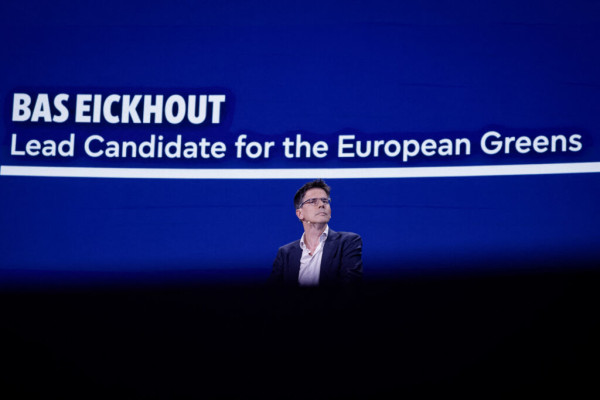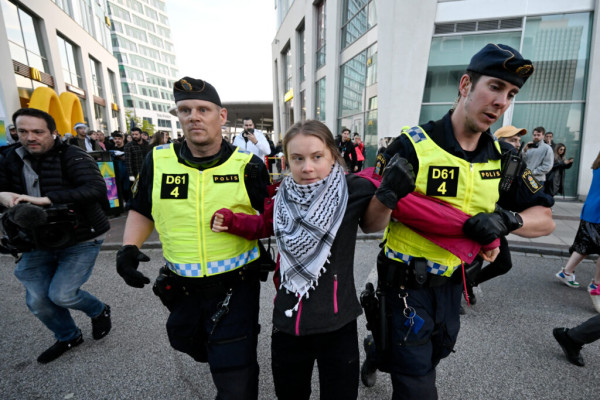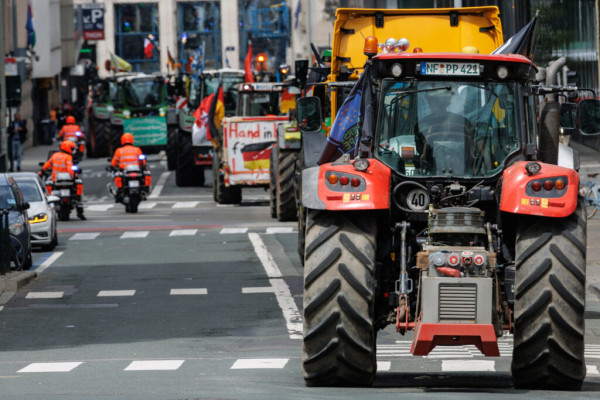Whatever happened to the climate kids?
Five years ago, hundreds of thousands of students walked out of their schools in a coordinated global “strike” to demand climate action — and turned the 2019 EU election into a triumph for the Greens.
This month’s vote was different.
Green parties crashed, losing more than a quarter of the seats they’d won in the European Parliament five years earlier. The victorious right now claims a mandate to roll back green initiatives and slow efforts to cut pollution, even though climate change remains a widely held concern in the EU.
“This time, I think some politicians felt more freedom to fully attack the climate agenda,” the Greens’ lead candidate, Bas Eickhout, said. Without the moral urgency of young people on the pavements and in the news, global warming was simply “less prominent” in the campaign, he added.
So, what happened to the climate kids?
A movement that was once unified around a single, simple call for older generations not to steal their future, is now riven with internal divisions — over campaign tactics, interpersonal disputes and the new global political emergency of the Gaza war. After years of protest, these young activists are also getting tired.

“We're all over the place, honestly,” said Dominika Lasota, a Polish activist, who helped to lead Fridays For Future. That movement, started by Swedish activist Greta Thunberg, called on school students to quit classes each Friday and saw millions join marches around the world in 2018-19.
The contrast between the two elections was stark. In 2019, climate marches were global news events.
Outnumbered and divided
On the Friday before this year’s EU election, Thunberg marked her 302nd consecutive weekly climate protest with a low-key gathering of fewer than two dozen campaigners outside the European Commission building in Stockholm. “We're so outnumbered and divided,” Lasota said.
There were still marches, attended by thousands, across 13 countries. But the youth activists who transformed the last EU election, forcing politicians to act, no longer capture the media attention or public sympathy they once did.
In that context, a push against climate policy from the right has met little resistance. Farming and industrial interests have won concessions and even reversals of EU policy. A relatively small and brief set of farmers’ uprisings earlier this year was able to shift the terms of the EU debate.
Luisa Neubauer a leader in the German arm of Fridays For Future, said opposing forces, especially the far-right political parties that won big this year, had become more “professional” and better at turning climate policy into a weapon.
It’s certainly been effective. The same leaders who once jostled to drape their arms around Europe’s young climate evangelists are now seeking the embrace of the far right. European Commission President Ursula von der Leyen, who invited Lasota and Neubauer to her Brussels office in 2022, has said she might work with Italy’s hard-line Prime Minister Giorgia Meloni, who has backed the oil and gas industry and fought EU efforts to ban combustion engine vehicles.
Young progressives say there are simply too many crises to attend to these days.
“Now,” said Lasota, “there isn't a climate movement.” Instead, she said, there were fractured groups pursuing multiple justice-related causes and struggling to find a simple unifying message. Lasota herself has led campaigns for abortion rights and anti-Russian war protests in Poland.
Gaza war
One particularly bruising fight within the movement is over the war in Gaza. After Israeli troops moved in, Thunberg immediately leapt to the defense of the Palestinians. On June 7, she joined a few dozen others at climate talks in Bonn, Germany, in an effort to “highlight the links between fossil fuels and violence like the ongoing genocide in Palestine.”
Some activists have made efforts to link these issues into an overarching narrative about colonialism and inequality. But the fight for Palestine has sucked time and energy away from the climate change movement. It has also caused conflict within it.
“I really think that for people my age, Palestine is absolutely a decisive matter,” Lasota said. “All of my friends that I knew from strictly climate campaigning are now into something else. Except for perhaps Germany.”

Like many German institutions, the country’s youth climate campaigners have been reluctant to criticize Israel. Neubauer publicly broke with Thunberg over her stance. That has isolated the German wing of Fridays For Future — the largest, best-funded and most active part of the movement in Europe. “Like, even on the friends level we have grown distant,” Lasota said.
As the war progressed, the German group’s position slowly changed, said Neubauer, who decried Israel’s “war crimes, powered by German weapons.”
In Germany, such statements are fraught with legal and political jeopardy. After one march in Hannover, police launched an investigation into climate activists for pro-Palestine chants labeled as allegedly antisemitic. “This is the environment we are in,” Neubauer said.
One senior campaigner, who didn't want to be named as the topic is so sensitive, said the climate movement in general had “lost focus and become wrapped up in wider campaigns on Gaza and Israel that deflected attention off major polluters.”
The pandemic has also played a role. Covid struck at the start of 2020, just when the movement was at its zenith, forcing young people, along with everyone else, online for many months. During that time, Thunberg addressed activists from developing countries and shifted her attention toward global justice campaigning, of which she says climate action is a fundamental part.
There is also disagreement over tactics. Thunberg has stepped back from most media engagements and taken up the fight with more radical protests: She has been detained by police in multiple countries in recent months. Others believe the group needs a return to the mass mobilizations of the past.
Men and their machines
“I feel like we have abandoned what we were best at, which was shaking up the whole political scene,” said Lasota. Smaller, more hardcore protests, like the road blockades run by Letzte Generation in Germany or Just Stop Oil in the U.K., have been shown “not to work,” said Neubauer.

But simply repeating the mass marches would not work because the media no longer find the movement new and exciting, said Neubauer. Nor are the kids actually kids anymore: They are university students or professional campaigners.
It would be “stupid to assume that this is just about numbers on the streets,” she said. The farmers’ protests, in which tractor-loads of manure and burning tyres were dumped in the streets of European capitals, were not as big as the climate marches of the past but still changed policy. “We’ve seen how a few men and their machines can cause a huge uproar,” Neubauer said.
It was also wrong to say that the climate kids went away, said Neubauer. In Germany, protests still regularly attract thousands. Rather, it was the older generation that had shown itself to be fickle, she said.
Why, Neubauer asked, should the youth movement alone be held responsible for ensuring that climate change was at the center of the European election? After all, 373 million adults could vote. “Since when is this our issue?” she said.